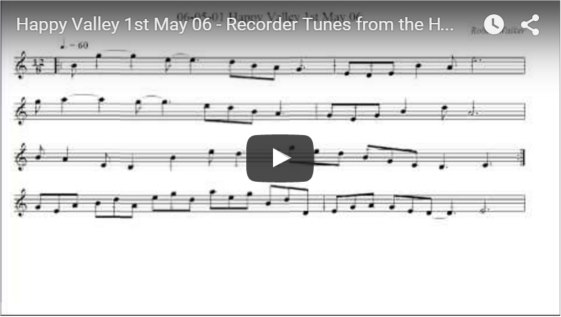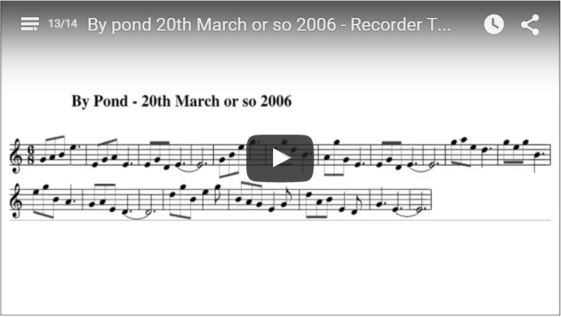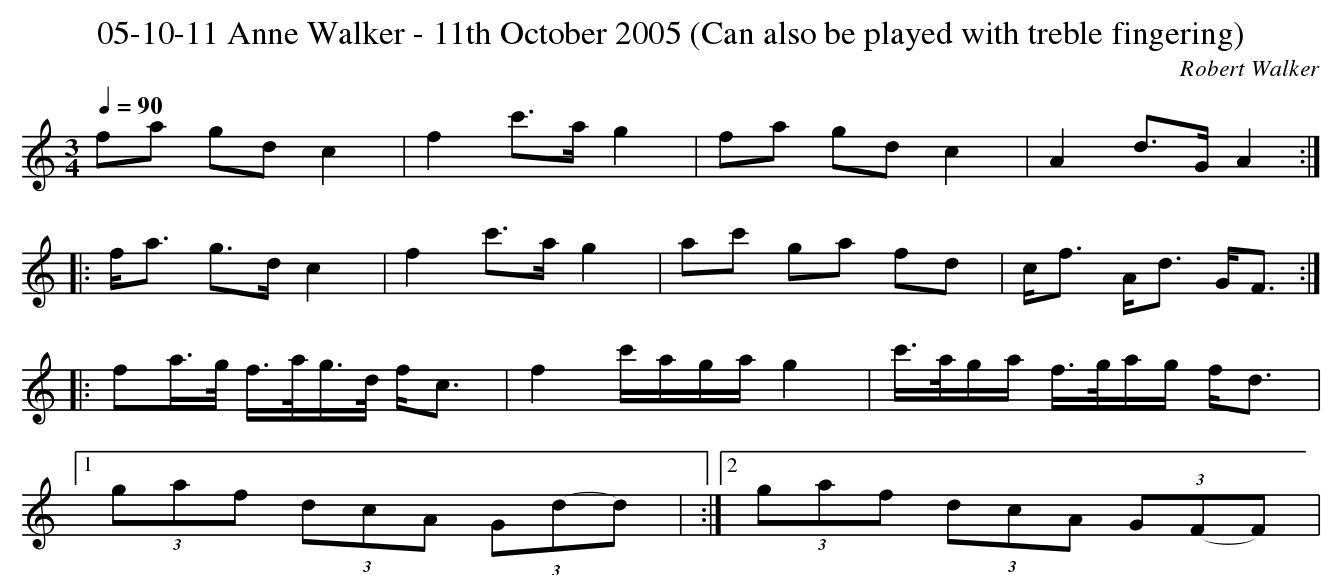
164 Tunes for Solo Recorder
For my mother Anne Walker, Died September 2006 age 81
Copyright © Robert Walker (UK). All rights reserved.
163 Tunes for solo descant recorder.
If you have purchased this kindle book, you get the pdf (useful if you want to print out the scores) and abc versions of the scores as extras, for free. For details, see How to download the sheet music as a pdf and in abc notation at the end of this booklet.
Many of these tunes were composed out of doors, and they were noted down quickly with few or no changes. The idea was to compose more and more spontaneously, in the way many impressionist painters painted, and the way Japanese and Chinese calligraphy is done, and also the way birds sing.
I wrote these after my mother died, staying in the house she lived in, so she was an inspiration for the tunes. So I dedicate them to her.
There are too many tunes to give names to them all. So I just name them by the date, and the place where I wrote them.
Though I say "descant recorder" in the title, you can play them on any member of the recorder family. For recorders in keys other than C, such as the treble recorder, bass recorder, or "voice flute", you can transpose the tunes by using descant fingerings. I.e. read the score as if you were playing the descant.
Also, because of the recorder's small compass, they are well within the range of just about any woodwind instrument, and indeed most other instruments. If your instrument has a two octave range, starting from middle C, or you can transpose it to a two octave range on sight, you should be fine.
I have a few here as youtube videos in a play list, which should give you an idea.
(click to watch on youtube) - play list

(click to watch on youtube) - play list
Most are to be played cantabile style like a singer, or perhaps like bird song, in a style "without a care in the world" as if each note is arising spontaneously in that moment. Most should be easy to play, which helps. If you find some of them hard, it may help to skip and try the easiest ones first.
I haven't given performance style markings, because - the idea is that the performer is part of the creation of the tunes.I have given suggested tempi, but these are for guidance only, feel free to play them at any tempo. Most are fairly slow, up to Andante, an occasional Allegro. It's not a case of playing as fast as possible to show off your virtuosity :). Though, do feel free to improvise trills and embellishments, and new notes as well if that is natural to you, just as performers used to do in the Renaissance period; it adds to the liveliness and spontaneity of the music.
Also if you make mistakes, but they sound great, go with it - you'll notice I sometimes do that in the recordings.
And if you find the notes move around in time, like the rhythms of a singer, but sound great, again, go with it. For more on this, see the notes on performance at the end. Also, alternatives to metronome use.

.gif)
.gif)
.gif)
.gif)
.gif)
.gif)
.gif)
.gif)
.gif)
.gif)
.gif)
.gif)
.gif)
.gif)
.gif)
.gif)
.gif)
.gif)
.gif)
.gif)
.gif)
.gif)
There are another one hundred and forty tunes in the complete book. You can get them all if you buy the kindle book Recorder Tunes from the Heart from amazon.
You don't need to have a kindle device to read this book. You can download an app to read it off-line, on your computer, tablet or mobile device. Or you can read it directly in your browser.
You can also get the tunes as a pdf for printing. Also as abc notation which is useful if you want to add annotations, or edit the music in any way - or if you want to play the tunes in midi - perhaps to get a first idea of the timing for some of the more complex rhythms.
To get the pdf or the abc notation version, buy the kindle edition first. Then go to the end of the booklet and you'll find instructions on how to download the extra content.
If you have any questions at all, contact me at support@robertinventor.com.
Thanks!